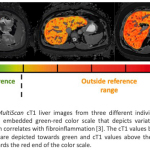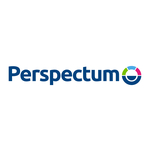New study finds Perspectum’s LiverMultiScan may positively impact patient participation in liver disease care pathways

OXFORD, England–(BUSINESS WIRE)–#FattyLiver–Perspectum®’s LiverMultiScan® significantly enhanced patient understanding of chronic liver disease (CLD) care in a first-of-its-kind study published in the Journal of Patient-Reported Outcomes, highlighting how it can help improve adherence to lifestyle interventions. Using a qualitative, interview-based approach, patients with CLD reported their first-hand experiences and perceptions of how LiverMultiScan’s easy-to-understand information can educate and empower them towards self-management of their disease condition.
The global burden of CLD is growing at an alarming rate, fueled by the increasing prevalence of obesity and related metabolic disorders, alcohol abuse and viral hepatitis. In the UK alone, deaths from CLDs have risen 400% since 1970.1 This crisis is compounded by patients and caregivers’ poor understanding and management of these diseases and inadequate physician support. Liver biopsy, the current gold-standard for diagnosing and monitoring CLDs, is an invasive diagnostic involving significant health risks and patient discomfort.2 Hence, there is an urgent need for non-invasive diagnostics that not only provide clinical utility but are also complication-free. LiverMultiScan’s proprietary diagnostic technology checks all these boxes, providing comprehensive information on liver health painlessly and in a format which can easily be comprehended by patients themselves.
In this study, 101 participants affected by liver disease received LiverMultiScan followed by a structured interview asking them to reflect on their experience of the procedure and their understanding of the results compared with their current standard of care. None of the participants were in favour of undergoing liver biopsies to monitor disease progression or treatment responses. Victor, a 36-year-old Hepatitis B patient, found undergoing a liver biopsy “excruciatingly painful” and “traumatic” and “wouldn’t want to go through any liver biopsy again.” The study participants also showed a strong desire to be actively involved in their disease care – as highlighted by Jamie, a 58-year-old CLD patient, who said, “It’s my body and I’m doing whatever I do to it – so I want to be a partner. Whatever you (the doctor) know, I want to know as well.”
The participants felt that LiverMultiScan provided them with clear and understandable information; central to this was the prominent color-scaled pictorial elements of the report. The liver images in the report have an embedded green-red color scale that depicts variation in a metric called cT1, which correlates with fibroinflammation3. cT1 values below the upper limit of normal are depicted towards green and cT1 values above the upper limit of normal are depicted towards the red end of the color scale (see figure 1). According to Lynne, 55-year-old suffering from Autoimmune Hepatitis, “The visual clarity (of LiverMultiScan) is just stunning, and so easy to understand. Because you haven’t done anything fancy, you’ve just used red, amber, green. So I can see at a glance.”
Patients’ self-reported understanding of their liver disease – as measured by a quantitative research questionnaire – increased significantly, from 6.28 to 9.22 (on a scale of 1-10) after undergoing a LiverMultiScan. Many participants also explicitly stated that better disease comprehension can lead to better disease outcomes, reduced stress, and improved patient-physician relationship. This general perception of the group was aptly put across by James (60-year-old male suffering from Hepatitis C) who said, “As I said to you earlier, it’s an encouragement to keep going with the lifestyle I’ve been leading for the last few years. That’s fantastic.”
Wayne Eskridge, liver disease patient advocate, CEO and founder of the Fatty Liver Foundation said, “As a cirrhosis patient and founder of the Fatty Liver Foundation, I have had many tests and communicate with thousands of other patients about testing. The value for patients of visual representations of their organ health is intuitively understood within the community. We respond to the images. I’m very pleased to see research seeking to quantify this important patient dynamic.”
Read the full paper here.
References
- Williams, R., et al. (2014). Addressing liver disease in the UK: a blueprint for attaining excellence in health care and reducing premature mortality from lifestyle issues of excess consumption of alcohol, obesity, and viral hepatitis. Lancet, 384(9958),1953–1997.https://doi.org/10.1016/S0140-6736(14)61838-9
- Thomaides-Brears, H., et al. (2021). Incidence of complications from percutaneous biopsy in chronic liver disease: a systematic review and meta-analysis. Digestive Diseases and Sciences. Advance online publication. https://doi.org/10.1007/s10620-021-07089-w
- Dennis, A., et al. (2021). Correlations between MRI biomarkers PDFF and cT1 with histopathological features of non-alcoholic steatohepatitis. Frontiers in Endocrinology, 11, 575843. https://www.frontiersin.org/articles/10.3389/fendo.2020.575843
About Perspectum
Perspectum, a global medical technology company with offices in the U.K., the U.S. and Singapore, delivers leading digital technologies that help clinicians provide better care for patients with chronic metabolic diseases, multi-organ pathologies and cancer. With a strong focus on precision medicine using advanced imaging and genetics, our vision is to empower patients and clinicians through quantitative assessments of health enabling early detection, diagnosis and targeted treatment. With a diverse team of physicians, biomedical scientists, engineers and technologists, Perspectum offers a way to manage complex health problems at scale.
Contacts
For Further Information:
For Perspectum
Nellie Wild
VP Corporate Affairs
Perspectum
nellie.wild@perspectum.com
.jpg)

